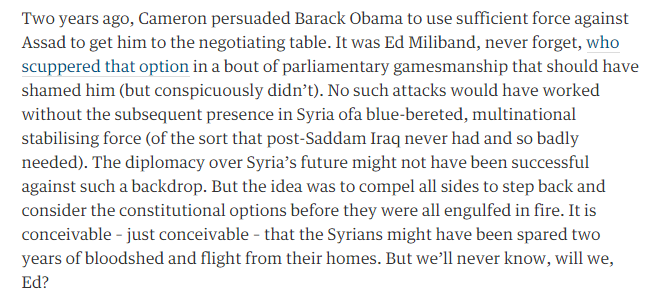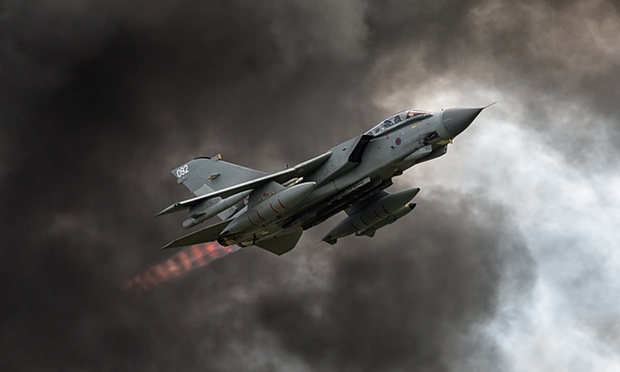1
A very interesting article showed up in The Telegraph last Monday. Headlined “Break up the RAF and stop buying British”, it seems like an article that the sub-editors have sexed up2 but it actually follows through. It’s worth reading, so I’ll give you a few seconds.
As I write this, I’ve started to see some flaws which I’m sure, if they’re reading, the more military-minded of my readers will be able to pick apart 3 4.
But basically, it’s good. I wrote about several of the issues he raises during my time with NATO Council – the F-35 here, the aircraft carrier here, the troop number cuts here, and the impact of all the cuts on the fight against ISIS here.

here’s a picture of some BAE products from the Daily Mail
What had somewhat eluded me was the overall impact of all this.
Perhaps because I’m so on the fence about all this I had only seen the opposing positions of the left (the UK military budget is too big and needs further cuts) and the right (the British military is too small and needs a bigger budget), missing the actual disconnect between budget and capability that renders both positions almost moot. Solving the problems identified in this article would probably enough to satisfy both sides, which sort of points to how major the problems are.
The arguments in this piece undermine some of the key defences of government support for the arms industry. This is generally either legitimised through its provision of industrial jobs or, in the case of export support, through the fact that exporting weapons helps keep costs down for domestic procurement, giving the armed forces security of supply. As Page points out – BAE is cutting jobs all the time, and as the Campaign Against [the] Arms Trade shows every few years, for every British job created by the arms trade, the government gives thousands of pounds in subsidies. Meanwhile, even with this support and subsidy, military procurement is still obscenely expensive, and still isn’t independent. The complex web of beneficial side-effects used to justify government policy collapses entirely and an overhaul seems like a no-brainer.
It isn’t going to happen though.
There are fairly dispiriting but obvious reasons for this. They don’t even all require buckets of cynicism to accept.
For one thing, the arms industry is corrupt as hell, both overtly and also in terms of the general dodgy practices that keep big business big. They’d presumably fight quite hard to keep afloat.
For another, this is the sort of radical change that requires some concerted effort behind it to actually get anywhere. Insofar as corporate power is likely to be opposed, that leaves the people. In terms of being better protected, having our taxes better spent, less of our fellow citizens killed for lack of equipment, etc. etc., “we the people” would benefit from this sort of change. Unfortunately, it’s your classic collective action problem – the minority who stand to lose from this proposal would lose a lot, while the majority who would gain would only gain a little, and as I wrote in what feels like eight very boring essays this term, those are difficult to overcome 5.
The bright side, though.
When placed under scrutiny for its fuckery, the arms industry and its advocates point to hard-nosed self-interest. First time I’ve done this, but from my dissertation:
“On one occasion, the Minister of State for the Armed Forces, when questioned about Britain selling arms to the “murderous dictator” Suharto (HC Deb 12 January 1993 vol. 216 c749), outright stated: “The point of selling Hawk aircraft to Indonesia is to give jobs to people in this country” (HC Deb 12 January 1993 vol. 216 c749). This quote highlights two things – first, that the primary motivation expressed by policy-makers for the Hawk sale to Indonesia was economic […] The second is that the economic argument was used as a direct response to criticism of the human rights implications of the sale.”
Researching this was an infuriating process because where the government could, they would outright deny, in the face of all evidence, that British weapons were used in human rights violations 6. Where this was impossible, they’d do it anyway, and obfuscate a bit (see also: the coalition waiting until Israel was basically done bombing Gaza to threaten sanctions if they carried on, and then ignoring the fact that they carried on). Finally, if their backs were up to the wall, they’d yell “jobs!” and hide.
This was particularly infuriating, because, again, the non-moral arguments are just as bad as the moral ones. In fact, I reckon you could make better economic and strategic cases against government support for arms exports than any of the moral arguments that get made on a regular basis7.
Bright side is coming, I promise.
First – the CAAT’s latest campaign, Arms to Renewables (explained in catchy infographic form here) places a stronger emphasis on a) the economic arguments and b) the positive alternatives to the arms industry – instead of swords to ploughshares it’s APCs to solar panels or whatever. Not only is this set of arguments much stronger on their own merits, it also connects the CAAT to zeitgeisty campaigns like fossil fuel divestment.
Second – that the article which kicked this all off was written by a veteran and published in the Telegraph offers the possibility that anti-arms industry campaigns don’t necessarily have to be of the left and run by students and Owen Jones. Obviously, the CAAT is honourably anti-war, while Page and the Telegraph seem mostly concerned that the current system places constraints on our ability to solve policy problems with precise application of high explosives. They are unlikely to become bosom buddies. As I said earlier, however, solving the problems Page identifies goes some way to resolving both left and right’s issues with defence spending. There seems to be potential for the sort of non-partisan campaign that could create a broad coalition and ultimately produce some sort of Review of policy which would implement superficial change while leaving the rotten edifice largely intact.
Didn’t say it was going to be a proper bright side, did I?
1 among all this company’s many crimes, it’s ever-changing acronym over the past twenty years has to be up there – throughout my dissertation it went backwards and forwards from BAe to BAE to British Aerospace Systems. Evil.
2 admittedly a very limited and tedious definition of “sex” here
3 Robert Farley, who is excellent and makes similar arguments across the Atlantic, centres his case in Grounded (which I haven’t read, so pinch of salt) around both the inter-service redundancies and tensions caused by the air-force (similar to Page, here) but also the inherent limitations of independently-operated airpower to win wars. Page lacks this second component, and based on the force makeup he argues for (the Navy as a helicopter launch platform, the Army centring on air support, etc.) he doesn’t seem to believe in it, which surely has some implications for the coherence of his position
4 for one thing, the French don’t buy American and they seem to do all right
5 This has actually become my favourite explanation for Why Things Are Bad.
6 still a bit annoyed I didn’t get to use this quote from Mark Phythian’s The Politics of British Arms Sales Since 1964 in the final draft but it is gold: “The possibility of their being used in East Timor prompted MPs Bob Parry and Bernard Braine, and Lord Avebury, to write to the FCO. The FCO reply to parry stated that the vehicles ‘can only operate on roads and in reasonably dry, open country. Their usefulness in the jungle and difficult terrain of East Timor would therefore appear to be limited.’ This was a dubious assertion, as it was far from obvious that the vehicles could operate only on roads, and seemed to assume, in any case, that there were no roads in East Timor.”
7 the latest one seems to be that we should cancel billion-pound contracts with Saudi Arabia because of their cruelty in the case of Raif Badawi. While this is undoubtedly Bad, it is very hard for me to understand how a momentary interruption in Riyadh’s supply of fighter jets (momentary because Dassault and Boeing would obviously be there in a heartbeat to replace BAE) would do anything to help Saudi victims of human rights abuse. There’s a stronger case, admittedly, regarding the war in Yemen, which arguably places sales to Saudi Arabia in contravention of UK rules regarding not selling weapons “which might be used for internal repression or external aggression”.



